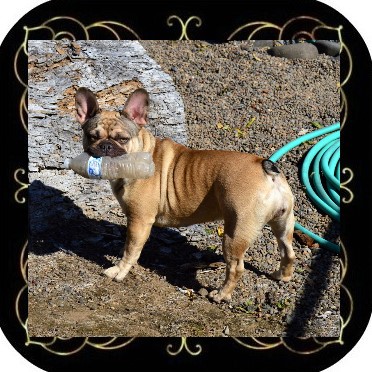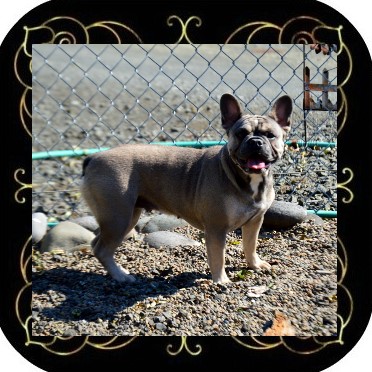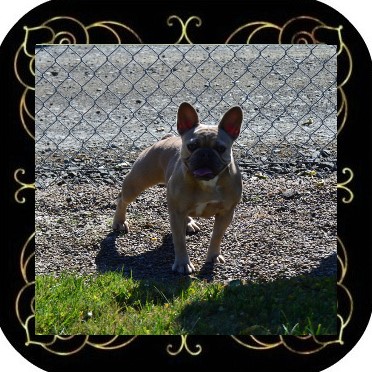When you see the image below displayed on any of the camera feeds, please be patient they may disconnect and reconnect occasionally.

Tips in Viewing the live Puppycams:
You may or may not be aware that the momma "diapers" the new babies to stimulate their bowels and bladders to evacuate. This is necessary, otherwise the pup will not defecate or urinate on it's own and it is very unhealthy. Momma will continue to clean the pups and consume their urine and feces well into 3-4 weeks of age. Once the pups are successfully eating soft mash in the morning and evening, and drinking from the water bowl, they are weaned. This usually occurs between 5 to 6 weeks of age. By that time momma is having a negative impact on her own digestion because of all the feces the puppies are producing, which she is still eating.
At 3-4 weeks of age the puppies also graduate from the covered wading pool and have access to the entire apartment.
The puppies have their dewclaws removed at 5 days of age. They are wormed and and nails trimmed at 3 weeks of age. Then another worming, nail trim and weaning at 5-6 weeks of age. The puppies Vaccinations are given at 7, 10, 13, 16 weeks of age. ( we administer our own vaccinations here, we use Nobivac Canine 1-DAPPv or 5 way - Parvo, distemper, hepatitis, influenza and respiratory)
The puppies are then ready to go home with you as early as 10 weeks of age. It is our professional standard that we do not release any puppies before the age of 10 weeks old and they have received at least 2 of their puppy vaccinations completed.
You may notice, the cameras are in color part of the time, and then appear black and white. This is because when we only have a nite light on in the evening, the camera is on the infrared setting. Turning the overhead lights out and only having the nite light on is important for the puppies and mommas to experience a normal diurnal cycle of day and nite.
|
IMPORTANT!! PLEASE READ!!
Please carefully consider if you are comfortable choosing a puppy at a very young age. The older the pup is when you choose it, the less unknowns about the pup there will be.
Puppies are very fragile in many ways, especially the first month of life. They have low to no resistance against diseases. They cannot regulate their own internal body temperature (much like a reptile) for the first 3 weeks of life. They can be laid upon by their mother and crushed, and the mother would not even be aware. With first time mothers there is always the possibility she may even harm or kill her pups.
Vision and hearing capability of the pups cannot be tested until at least 4 weeks of age. Personality usually does not start to become apparent until about 6 weeks of age and older.
About Viewing our PuppyCams -
We want all puppy families to realize that while the puppycams are a wonderful way for you to watch your puppy grow up, you may witness things that might alarm or upset you. We do not turn the cameras off, all views are in real time, not video recordings.
If you are watching the PuppyCams and see something that concerns you, please give us a call.
|
PLEASE READ THE FAQ BELOW!
French Bulldog Puppy Frequently Asked Questions
Here you will find some answers to some of the most asked questions about french bulldogs Puppy growth and development, as well as some details about the Mother's experience.
PUPPY TIME LAPSE 1 day to 8 weeks from Carli Davidson on Vimeo.
-
Newborn Puppies
At birth, puppies are blind, deaf and toothless, unable to regulate body temperature, or even urinate or defecate on their own. Normally, Puppies depend on their mother and littermates for warmth, huddling in cozy piles to conserve body temperature. A puppy separated from this warm furry nest can quickly die from hypothermiaâlow body temperature.
* We use 150 watt warming lamps, so you will see the pups off on their own, comfortable and warm. A puppy that is fat and happy will be seen on it's back "sunbathing".
Puppies first experience the sensation of being petted when washed by their mother's stroking tongue. The bitch licks her babies all over to keep them and the nest clean, and also to stimulate them to defecate and urinate. The dam may develop diarrhea, this is often from cleaning up puppy waste.
Neonatal Period: Birth to Two Weeks-
From birth, puppies are able to use their sense of smell and touch, which helps them root about the nest to find their mother's scent-marked breasts. The first milk the mother produces, called colostrum, is rich in antibodies that provide passive immunity and help protect the babies from disease during these early weeks of life. The dam's discharge is usually gone by 2 weeks, but can last up to 8 weeks. After the birth, the dam's hair always falls out while she is raising a litter. Up to 60% of it can fall out, but normally 40% does. It likely happens to help cool them; this is normal and it can come out in chunks. Sometimes you will not notice much hair at all come out. Some lose it gradually, some suddenly.
For the first two weeks of life, puppies sleep nearly 90 percent of the time, spending their awake time nursing. The prolonged sleeping patterns of newborn puppies are there for a purpose; indeed, while those pups heavily snooze, they're actually growing. The pronounced twitching and jerking taking place during sleep is actually part of a deep form of sleep known as ''activated sleep.'' Until the pup is 4 weeks old, this form of sleep will prevail, since its main purpose is to strengthen muscles, develop the nervous system and initiate new neural pathways. All their energy is funneled into growing, and birth weight doubles the first week. Newborns aren't able to support their weight, and crawl about with paddling motions of their front legs. The limited locomotion provides the exercise that develops muscles and coordination, and soon the puppies are crawling over and around each other and their mother.
Transitional Period: Week Two-to-Four
The second week of life brings great changes for the puppy. Ears and eyes sealed since birth begin to open during this period, ears at about two weeks and eyelids between ten to 16 days. This gives the furry babies a new sense of their world. They learn what their mother and other dogs look and sound like, and begin to expand their own vocabulary from grunts and mews to yelps, whines and barks. Puppies generally stand by day 15 and take their first wobbly walk by day 21.
By age three weeks, puppy development advances from the neonatal period to the transitional period. This is a time of rapid physical and sensory development, during which the puppies go from total dependence on Mom to a bit of independence. They begin to play with their littermates, learn about their environment and canine society, and begin sampling food from Mom's bowl. Puppy teeth begin to erupt until all the baby teeth are in by about five to six weeks of age. Puppies can control their need to potty by this age, and begin moving away from sleeping quarters to eliminate. It is usual for us to remove the whelping pool and give the pups the entire apartment to explore between 3-4 weeks of age.
Socialization Period: Week Four-to-Twelve
Following the transitional phase, puppies enter the socialization period at the end of the third week of life; it lasts until about week ten. It is during this socialization period that interaction with others increases. The most critical period--age six to eight weeks--is when puppies most easily learn to accept others as a part of their pack.
Beginning at four weeks of age, the bitch's milk production begins to slow down just as the puppies' energy needs increase. As the mother dog slowly weans her babies from nursing, they begin sampling solid food in earnest.
The environmental stimulation impacts your puppy's rate of mental development during this time. The puppy brain waves look that of an adult dog by about the 50th day, but he's not yet programmed--that's your job, and the job of his mom and siblings. Weaning typically is complete by 5-6 weeks of age.
Week Eight-to-Twelve
Puppies often go through a "fear period" during this time. Instead of meeting new or familiar people and objects with curiosity, they react with fearfulness. Anything that frightens them at this age may have a lasting impact so take care that the baby isn't overstimulated with too many changes or challenges at one time. That doesn't mean your pup will grow up to be a scaredy-cat; it's simply a normal part of development where pups learn to be more cautious. Careful socialization during this period helps counter fear reactions.
Puppies may be placed in new homes once they are eating well on their own, using their litter boxes and at least 10 weeks of age. Puppies tend to make transitions from one environment to another more easily at this age, too.
Your puppy still has lots of growing to do. He won't be considered an adult until he goes through several more developmental periods and reaches one to two years of age.
|













